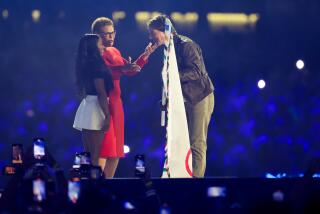Doubly Bubbly
- Share via
ATHENS — The race of the century showed up.
It arrived a day later than was expected, and featured a much larger cast of characters in the swimming pool. After all, these things don’t show up on demand.
But here Tuesday at the Olympic Aquatic Center, 20 years after one of the greatest swimming races -- the upset of Michael Gross and his West German teammates by the United States -- there was another installment in the series of unforgettable Olympic 800-meter freestyle relay races.
Grossbusters, meet Thorpedobusters.
On the anchor leg, American Klete Keller fought off a stirring challenge from the best 200-meter freestyler in the world, Ian Thorpe, winning by thirteen-hundredths of a second, ending Australia’s seven-year international hold on the event. Thorpe’s leg, 1:44.18, was the second-fastest relay split in history.
“You always have in the back of your mind, a big race,” Keller said. “You always picture it. When it finally comes, it’s like you’re in another world, it’s an out-of-body experience. It’s like you have no mind at all. It’s all a blur. It actually still is.”
Said Michael Klim: “It was just a magic race.”
And Klim was part of the losing side.
The American foursome of Michael Phelps, Ryan Lochte, Peter Vanderkaay and Keller won in 7 minutes 7.33 seconds. The Australians -- Grant Hackett, Klim, Nicholas Sprenger and Thorpe -- took the silver in 7:07.46. Italy, in 7:11.83, won the bronze.
Phelps apparently wasn’t kidding when he said the pressure exerted by his pursuit of Mark Spitz had lifted when he lost to Thorpe on Monday in the 200 freestyle, in what had been billed as the race of the century. The defeat meant Phelps could not match the record of seven gold medals won by Spitz in one Olympics.
Everyone should take losses so hard. Phelps coped by adding two more gold medals to his collection, winning the 200 butterfly before swimming the relay, with about an hour’s worth of rest in between. He has three gold and two bronze medals, with three events left.
Phelps faced an unexpectedly difficult challenge in the 200 fly, winning by 0.52 over Takashi Yamamoto of Japan. Phelps’ winning time was an Olympic-record 1:54.04 and he welled up on the podium as the national anthem was played.
“I left a lot of tears on that podium,” he said.
With scant time to compose himself, he went 1:46.49 in the opening leg of the relay against Hackett’s 1:47.50. Then came the hard part -- watching his teammates. Lochte and Vanderkaay gave Keller a decent cushion. But it didn’t take Thorpe long to cut into it. As it turned out, his effort to close the gap in the first 50 meters might have done him in.
“He over-swam the first part of the race and was dying at the end, barely able to hold on,” U.S. assistant Jon Urbanchek said. “He didn’t have a strong finish. Sometimes adrenaline takes over and intelligence takes a back seat.”
Said Klim: “We can’t expect Ian to be winning the relays for us all the time.”
U.S. Coach Eddie Reese had summoned the memory of the 1984 relay in a team meeting and asked his swimmers to avoid finishing poorly. “Eddie’s meetings are sometimes long-winded, but there is some wisdom in there,” Keller said.
Phelps found himself riding waves of emotion. He said he’d swum better than in Barcelona last summer at the world championships the night he set two world records in under an hour.
“It was an amazing race,” Phelps said. “We’ve been wanting to win this relay for so long. I knew it was going to come down to the end -- someone like Thorpe. It was exactly like 1984 -- with [American] Bruce Hayes and Michael Gross -- it came down to the touch.
“We all put together four amazing swims. It was unbelievable. We were so pumped and so excited. Watching Klete the last 200, his first 100, we were like, ‘He’s cruising. He’ll get into it the second 100.’ We were screaming like crazy. He’s a guy who will come home strong.”
Said Thorpe: “It was a good last 50 for me and a great one for Klete.”
Keller said the last 50 meters “hurt like hell” but happier feelings soon followed.
*
The day was not a total success for the American men. In the morning, Jason Lezak and Ian Crocker failed to qualify for the final of the 100 freestyle, meaning there will be no U.S. representation for the first time in a non-boycotted Olympics. Two-time Olympic champion Alexander Popov of Russia also failed to qualify.
More to Read
Go beyond the scoreboard
Get the latest on L.A.'s teams in the daily Sports Report newsletter.
You may occasionally receive promotional content from the Los Angeles Times.







